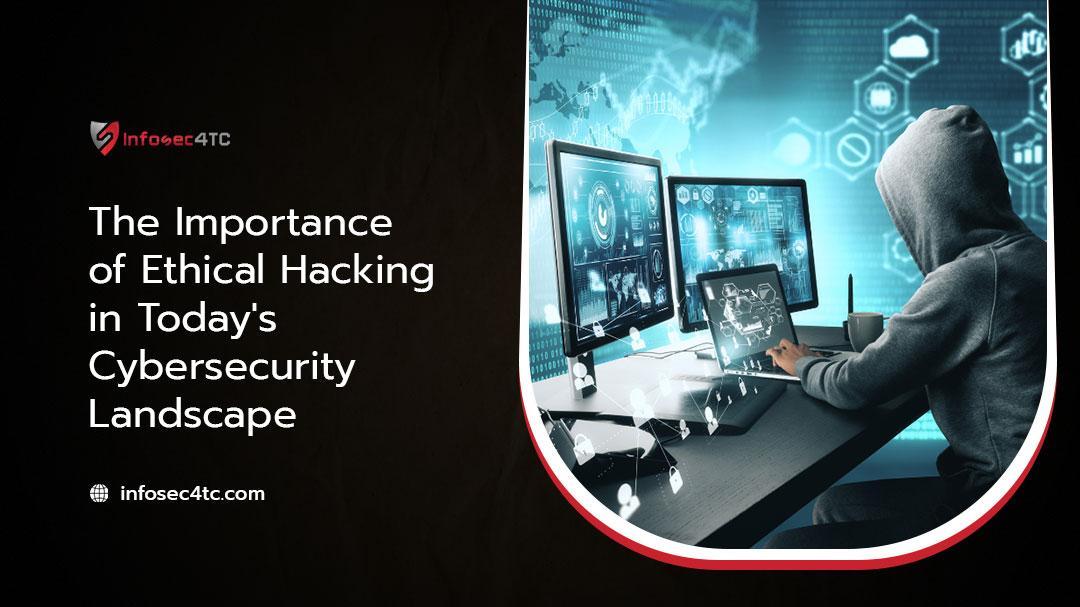In a world where data breaches and cyber-attacks are becoming increasingly common, it’s more important than ever to have robust cybersecurity measures in place. But how can we be sure that these measures are truly effective? Enter ethical hacking, the practice of deliberately trying to hack into a system to identify vulnerabilities and improve security. It is an essential tool in today’s cybersecurity landscape.
Visit Infosec4TC and discover the best cyber security courses online that can help you develop the skills and knowledge needed to succeed in this exciting and challenging cybersecurity industry.
If you are looking to pursue a career in cybersecurity? In this blog post, we’ll explore the importance of ethical hacking and why it should matter to you. But before that lets us first find out …
What is Ethical Hacking?
Ethical hacking is a practice that involves attempting to gain unauthorized access to a computer system, application, or data, but with authorization and a positive intent. Essentially, ethical hacking replicates the strategies and actions of malicious attackers to identify potential security vulnerabilities. By doing so, these vulnerabilities can be addressed and resolved before a malicious attacker can exploit them, ultimately improving the overall security of the system or application.
The Significance of Ethical Hacking in Cybersecurity
As more and more sensitive information is stored and transmitted digitally, the potential consequences of a cyber-attack are greater than ever before. A successful cyber-attack can result in significant financial losses, damage to reputation, and even legal liability. As a result of this, ethical hacking has become increasingly important in the field of cybersecurity.
An ethical hacking tests helps organizations to identify and address vulnerabilities before they can be exploited by malicious attackers. This proactive approach to security can help prevent data breaches, minimize the impact of successful attacks, and reduce overall cybersecurity risks.
What are the key concepts of ethical hacking?
Authorization: Ethical hacking is conducted with proper permission and authorization from the owner or manager of the system or network being tested. It ensures that the ethical hacker is not breaking any laws or ethical boundaries.
Positive intent: Ethical hacking is carried out with the intention of improving the security of the system or network being tested, not for personal gain or malicious purposes. If you want to enhance your career in this field then enroll for the best cyber security courses online.
Report vulnerabilities: Ethical hackers use the same techniques and strategies as malicious attackers to identify vulnerabilities and weaknesses in the system or network.
Respect data sensitivity: Ethical hackers may be required to agree to a non-disclosure agreement, as well as other terms and conditions specified by the assessed organization, based on the level of sensitivity of the data being tested.
Continuous learning: Ethical hacking is an ever-evolving field, and ethical hackers must continually update their knowledge and skills to keep up with new threats and technologies.

The Five Phases of Ethical Hacking
Here are the five phases of ethical hacking which a hacker uses to protect a network.
Planning and Reconnaissance: The first step in ethical hacking is planning and reconnaissance. It involves gathering information about the target system or network, including IP addresses, operating systems, software versions, and other relevant details.
Scanning: The next step is to scan the target system or network to identify potential vulnerabilities. This can include port scanning, vulnerability scanning, and other techniques to identify weaknesses.
Gaining Access: Once vulnerabilities have been identified, the ethical hacker attempts to gain access to the system or network using various techniques, such as password cracking, social engineering, or exploiting software vulnerabilities.
Maintaining Access: Once access has been gained, the ethical hacker tries to maintain access to the system or network to gather more information and identify additional vulnerabilities.
Analysis and Reporting: The ethical hacker analyzes the results of the testing and creates a report detailing the vulnerabilities found and recommendations for addressing them.
How to Become an Ethical Hacker?
If you are looking at cyber security as a career, there’s no one-size-fits-all approach. Unlike many other professions, there are no standard education criteria for ethical hackers, which means that organizations are free to set their own requirements for this position. However, there are certain educational paths that can provide a strong foundation for a career in ethical hacking.
A bachelor’s or master’s degree in information security, computer science, taking cyber security training courses, or even mathematics can be a great starting point for those interested in pursuing a career in ethical hacking. These fields provide a solid foundation in the technical skills and knowledge needed to excel in the field, including understanding computer networks, programming languages, and operating systems. In addition to these technical skills, aspiring ethical hackers should also possess strong problem-solving skills, attention to detail, and the ability to think outside the box.
How can Infosec4TC help you?
InfoSec4tc has been a leading provider of online information security courses, ethical hacking certification training, and consultancy services since 1999. Our commitment to providing high-quality, comprehensive training has been the driving force behind our success. From the very beginning, we have focused on delivering physical training and face-to-face courses that allow participants to engage with our experienced instructors and learn from their real-world expertise.

